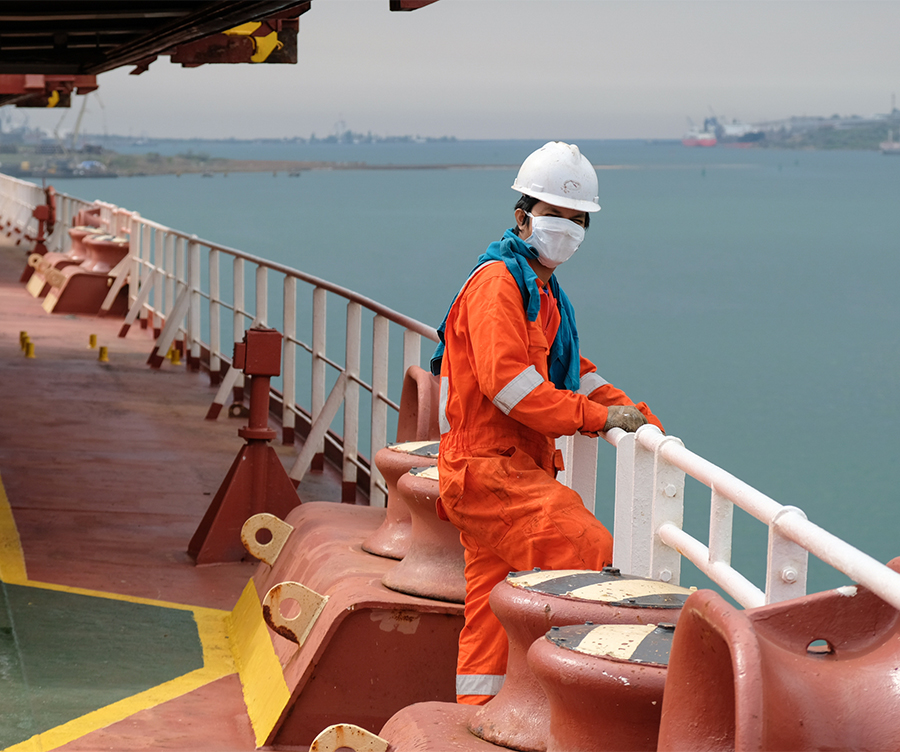Hundreds of thousands of seafarers remain stuck at sea, continuing to work and unable to be relieved as a result of Covid-19 travel restriction measures. The rotation of crews is a key part of maritime trade and without safe changeovers, supply chains and trade are at risk.
According to the International Maritime Organization (IMO), 400,000 seafarers from across the world are stranded on vessels because of the pandemic. Some seafarers have now been at sea for 17 months without a break, well exceeding the 11-month limit set out in the Maritime Labour Convention (MLC). Besides the 400,000 seafarers on ships, another 400,000 are unable to join vessels.
“The frustration for us is persuading governments to allow them to get off the ships; to ease travel restrictions for seafarers, classify them as essential workers and allow them to go home,” Guy Platten, secretary-general of the International Chamber of Shipping (ICS), told GTR at the GTR Commodities Virtual event earlier this month.
“It plays out in two ways. Of course, you have got the people on the ships who are tired and then you have other seafarers, who have no means of income because they are meant to be on ships.”
Ordinarily, on a monthly basis, 100,000 seafarers leave vessels having fulfilled their contracts, with 100,000 others travelling to ships to replace them. Since the pandemic was declared in March, that rotation has stopped or slowed right down. Platten says that only about 25-30% of the required crew changes are happening.
Margi Van Gogh, head of supply chain and transport at the World Economic Forum (WEF), explains the risks of little to no crew rotations to trade and the global supply chain. “We rely heavily on transport for the movement of goods in order to get food to our tables. If we’re not in a position to, at a country level, designate the appropriate status and get crews and replacement crews moving safely off and onto vessels, the global supply chain as we know it is at extreme risk – more than 80% of traded goods, including food moves by sea.”
In June, UN secretary-general António Guterres said on Twitter that the thousands of stranded seafarers are part of “an unsustainable humanitarian and safety crisis”, calling on all countries to formally designate seafarers and other marine personnel as key workers and ensure crew changeovers can safely take place.
Earlier this month, he voiced concerns again. “I renew my appeal to designate seafarers and marine personnel ‘key workers’ and ensure safe crew changes,” he wrote in a Tweet.
Van Gogh tells GTR that granting seafarers key worker status and ensuring safe crew changes for those stranded and those needing to resume work is a “global trade and human rights imperative”.
The IMO has published several testimonies of stranded seafarers. Matt, a chief engineer from the UK who is working on an overdue contract, says: “We have more than played our part during this pandemic. We have kept countries supplied with everything they could need: PPE and medical supplies, oil and gas to keep power stations running, food and water to keep people fed. All we want in return is to be able to come home and rest.
“We sail mainly in the Middle East and Asia and currently most countries in this region have very strict regulations that make crew change near impossible,” he says, adding that those on ships need to “see real action”.
Businesses worry over potential “forced labour” exposures
Businesses are also worried about their potential exposure to supply chain and human rights issues as a result of these restrictions. In a letter addressed to the UN’s Guterres on September 23, the CEOs of major consumer goods companies, including Unilever, PepsiCo and Danone, called on governments to designate seafarers as key workers and raised human rights concerns.
The letter says that by having seafarers on ships past their contract duration, supply chains for essential consumer goods have faced “major disruption”. “The situation has also inadvertently created a modern form of forced labour,” it states.
Van Gogh adds that key worker status must be granted to marine personnel, “not just for smooth functioning of the supply chain to assure the timely movement of essential goods such as food and medical supplies to the greater populations of the world, but because supply chains now risk being seen to employ ‘forced labour’ – modern day slavery claims are becoming a very real threat”.
She explains that shipping giant Maersk, among others, is taking things into its own hands and booking hotels to quarantine crew and facilitate safe crew changes.
The International Civil Aviation Organization has also published new guidelines to help facilitate repatriation flights for seafarers. The guidance outlines specific recommendations for seafarer changeover flights, including the need for communication, co-ordination and planning between shipowners, aviation stakeholders and the relevant authorities.
While global groups and businesses are putting pressure on governments to take action, WEF’s Van Gogh says that it is unclear when this deepening crisis may be resolved. “My guess is as good as yours. At some point, safety and mental health becomes a challenge. There are massive consequences from having people on vessels well beyond contracted periods. Global co-operation is needed to resolve this ongoing crisis, enabling seafarer crew changes that support sustainable global trading conditions.”
ICS’ Platten explains that seafarers and shippers have continued to move goods throughout the pandemic and until that stops, steps may not be taken. “I do wonder sometimes if that was to stop [goods being shipped], whether that’s the only thing that will force governments into actually taking action.”






